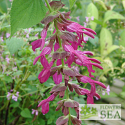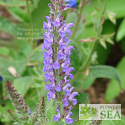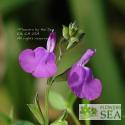(Li zhi cao) Unassuming in appearance, Salvia plebeia is a sage with powerful medical potential. In China, it has a long history of use in folk remedies for problems such as sore throat, bronchitis, urinary infections and inflammation of the liver.
Finding accurate definitions of Chinese botanical common names can be difficult. However, we know that the cao in li zhi cao refers to "herb" and is often used to denote a sage. One meaning for li is "power," whereas zhi sometimes means "plant of longevity.
Put it all together and you have "powerful herb for longevity, " which makes sense to us. However, we're open to better translations from any Chinese linguists out there.
The helpful Sylvan Institute of Botanical Medicine website notes other common names ranging from the homely shui yang er (water goat ear) to tian ming jing (heaven's bright essence). The latter name seems to indicate that S. plebeia spells relief.
Due to the size of its long blooming, white-to-lilac blue blossoms, Sylvan has dubbed this plant "Small Flowered Sage." It's small overall and is a candelabra-shaped species with mid-green, ovate foliage that is not delectable to deer.
Li zhi cao grows in the wild throughout Asia. Adaptable from full sun to partial shade, it is equally flexible about tolerating cold and heat as well as a range of well-drained soils. Also, although this is a water-loving perennial, it can get by on average supplemental watering based on local conditions.
Question?





